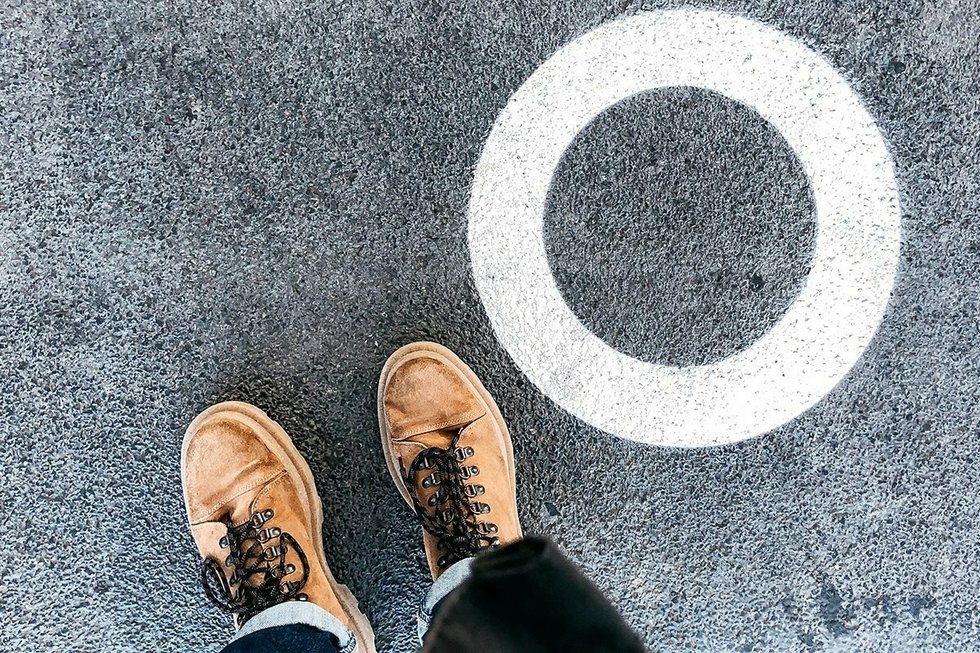Do you really need to get out of your comfort zone?
08 févr. 2022
6min


Freelance journalist and writer
How many times have you been told you should get out of your comfort zone? And how often have you seen the comfort zone described as something limiting, to be avoided at all costs? Over and over again, we hear that the only way to grow and be successful is to face the unknown and plunge headlong into the difficult stuff. But is this really the only way? What happens if we decide we prefer to stay in our comfort zone a bit longer?
Lately, research on the comfort zone has begun to shift: we’re questioning the viability of that pressure to work outside the zone and exploring its possible negative implications. With the help of one of our experts, Mackenzie Childs, an organizational psychologist, cognitive behavioral coach and founder of Blink Coaching, let’s explore the notion of the comfort zone and ask whether leaving it really is the only way to forward your career.
Let’s redefine ‘comfort zone’
What’s the definition of a “comfort zone?” Wherever you look, it’s pretty much the same. The comfort zone is described as “a situation where you do not have to do anything new or difficult,” “a space where one does not risk,” a mindset that “blocks growth,” “drives boredom and discontent,” and “creates boundaries.” But what if we were to look at it from a different perspective?
“I would define a comfort zone as a behavioral state within which a person operates in an anxiety-neutral condition,” says Mackenzie Childs. “Sometimes, in a comfort zone, mental boundaries are created to ensure a sense of security.” There is no fundamental proof that the comfort zone is inherently bad or harmful. Simply put, it is the space in which we are willing to navigate, where we feel the most comfortable and at ease. “Naturally, we operate very much within a comfort zone, that’s just the way we are as humans,” says Childs. “And I don’t think there’s anything wrong with that.”
That’s certainly how Stacey, a web designer, feels. She has been head of her department for the past two years, and recently decided to start her own web design company on the side. “For me, the comfort zone is not a place where you don’t grow, it’s a zone where you recharge. It’s somewhere you feel comfortable. And I believe we all need to cherish the time in our comfort zones, to restore our energy and check in with ourselves.” For Stacey, growth can only happen if we develop our comfort zone. “Spending time with yourself within your comfort zone is much needed if you want to grow, professionally and personally. Comfort zones store all the things you have already learned. Everything is familiar. Only if you appreciate the time in your comfort zone will you be able to safely branch out and learn things.”
Ines, an influencer marketing co-ordinator and founder of Seni Jewellery, also rejects the negative connotations of a comfort zone. “For me, being in my comfort zone is doing something I know how to do. It’s like I’ve mastered a set of skills, accomplished my goals.” She views her comfort zone as something essential to her personal and professional development. “Over the years, I have learned that in my work, to do my best and grow professionally, I need to feel comfortable, safe and relaxed. Having a comfort zone, being in a safe space that works for me individually, is how I do my work best and expand within my practice. Once I accomplish optimum comfort and confidence, I can take risks and work towards acquiring new goals.”
Make your comfort zone your own
What many of us tend to forget is that our comfort zones are part of us. But in a fast-paced world of comparison, where hustle culture is constantly catching up with us, it can be hard to separate what it is that we want and what society makes us believe we want.
Amira, an NGO consultant, admits she fell victim to this kind of thinking. “I’ve worked with many NGOs, so when I got an opportunity to branch out into sales and customer service, I thought, ‘Brilliant!’ I’m a very people-oriented person, I know how to handle social situations, I thrive when I’m around others. I thought this would be something that would make me grow professionally.”
Yet the sales experience wasn’t as pleasant as Amira expected. “I realized that as much as I love working for people and making them happy, this was not the case in sales. I actually lost that sense of helping people, I felt like I had to act, become a person I wasn’t—a person I didn’t like. And that made me realize that the sales industry was not for me.”
Contentment should be our baseline, Childs explains. “As an organizational psychologist, the question I have is: what are you trying to achieve? What is your goal? It’s about making that conscious decision of ‘Do I want more? Am I willing to take those calculated risks? Or am I OK with the state of contentment I am in now?’” To uncover your goals and establish your own baseline of contentment, Childs recommends a three-step emotional-intelligence approach.
1 Make yourself aware: Take the time to reflect and truly understand who you are as a person. Look at both your good and bad sides.
2 Confidently assess others: Once you have that foundation, you’re able to perceive others more effectively, as you’re not clouded by your own emotions.
3 Act and react: Now you’re able to handle agile situations better. You not only have a handle on yourself, but also on others. You can create agile interactions with specific goals in mind.
“We need to realize which goals we want to accomplish for ourselves and which goals are there to please others,” says Stacey, who learned how to distinguish—mostly by trial and error—between her professional desires that stemmed from comfort and those pushed by others. “*People used to tell me to branch out and create a YouTube channel to grow my skill set. And so I did it. I started making and editing videos, trying to teach others the ins and outs of graphic and web design.”
“But after a few months, I realized I actually didn’t enjoy anything about this process. I just don’t like making videos, it’s not for me. And I knew it before, but I just felt the outside pressure to do more and more, to not be stagnant.” After deciding to stop making videos, Stacey regained that sense of joy and comfort. “This experience, yet again, showed me that my comfort zone knows best. I have my goals and I know how to reach them—in my own time. Pressure to be more productive will not help me grow.”
“Instead of following the crowd, you have to make that decision for yourself,” Childs says. “It’s just a personal preference at that point to say, ‘Am I OK with where I’m at? Can I place myself in other situations and know that maybe that’s not something I want to do?’”
Take your time and let your comfort zone evolve
“To create maximum professional growth without leaving the comfort of your zone, I would highly recommend taking an assessment such as DiSC: (D)ominance, (i)nfluence, (S)teadiness and (C)onscientiousness,” Childs says. “An assessment allows us to look inward from a professional perspective and capitalize on the things we are already good at.”
Cherish your baseline of contentment for as long as you feel it’s necessary. “Then, every six months or so, re-evaluate and say, ‘Is this line of contentment where I want to stay or do I have new goals?’ I believe in reassessing where you are and where your comfort zone lies. But if you’re good where you’re at, then just stay and don’t fall victim to outside pressures.”
In Stacey’s case, time spent in her comfort zone plays a key part in her wellbeing—despite criticism from others. “I struggle with anxiety and panic attacks so staying in my comfort zone is what makes me feel safe. I constantly have to remind myself to take it easy and get back into my zone. I’ve been judged by people for growing my professional life a bit more slowly than expected by the hustle culture around us. But for me, this is key to achieving optimum growth.”
Stay in your comfort zone for as long as you feel it is necessary. Balance is key: a balance that works best for you. “Only once you feel you have maxed out on your capabilities within your circle should you reassess whether or not you want to leave your comfort zone,” says Childs.
Remember that our comfort zone evolves with us. “As we get older, the comfort zone gets broader, bigger and wider,” says Childs. Ultimately, the best piece of advice is to get to know yourself and your boundaries. “Find what makes you truly content in the moment, what brings you to the present.”
Ines knows from experience that this is good advice. “I don’t think that staying in your comfort zone is something bad,” she says. “If you know what you want, or what you want to experience professionally, your comfort zone will be where you grow.”
Photo: Welcome to the Jungle
Follow Welcome to the Jungle on Facebook on LinkedIn and on Instagram and subscribe to our newsletter to get our latest articles every day!

Inspirez-vous davantage sur : Construire sa carrière

Is a master's degree still worth it?
During a perfect storm of soaring tuition costs, automation and novel ways of online learning, is a master's degree still worthwhile?
23 mars 2023

Contextual intelligence: the skill that allows you to make better decisions
Adapting and understanding change is an important skill to advance your career. Here's how you can improve your decision-making skills.
31 août 2022

How to prepare for a performance review
Whether you're looking for a promotion or some extra support, solid groundwork and preparation are key to a successful performance review.
02 juin 2022

"I quit!" Three workers share their stories
Quitting can be stressful in life; the uncertainty for what the future holds can be intimidating. Here are three stories ending in liberation.
16 mars 2022

What if you land your dream job and then hate it?
Our idea of the dream job rarely takes into account the possibility of insurmountable problems. Realizing that your dream isn’t all...
07 févr. 2022
La newsletter qui fait le taf
Envie de ne louper aucun de nos articles ? Une fois par semaine, des histoires, des jobs et des conseils dans votre boite mail.

Vous êtes à la recherche d’une nouvelle opportunité ?
Plus de 200 000 candidats ont trouvé un emploi sur Welcome to the Jungle.
Explorer les jobs